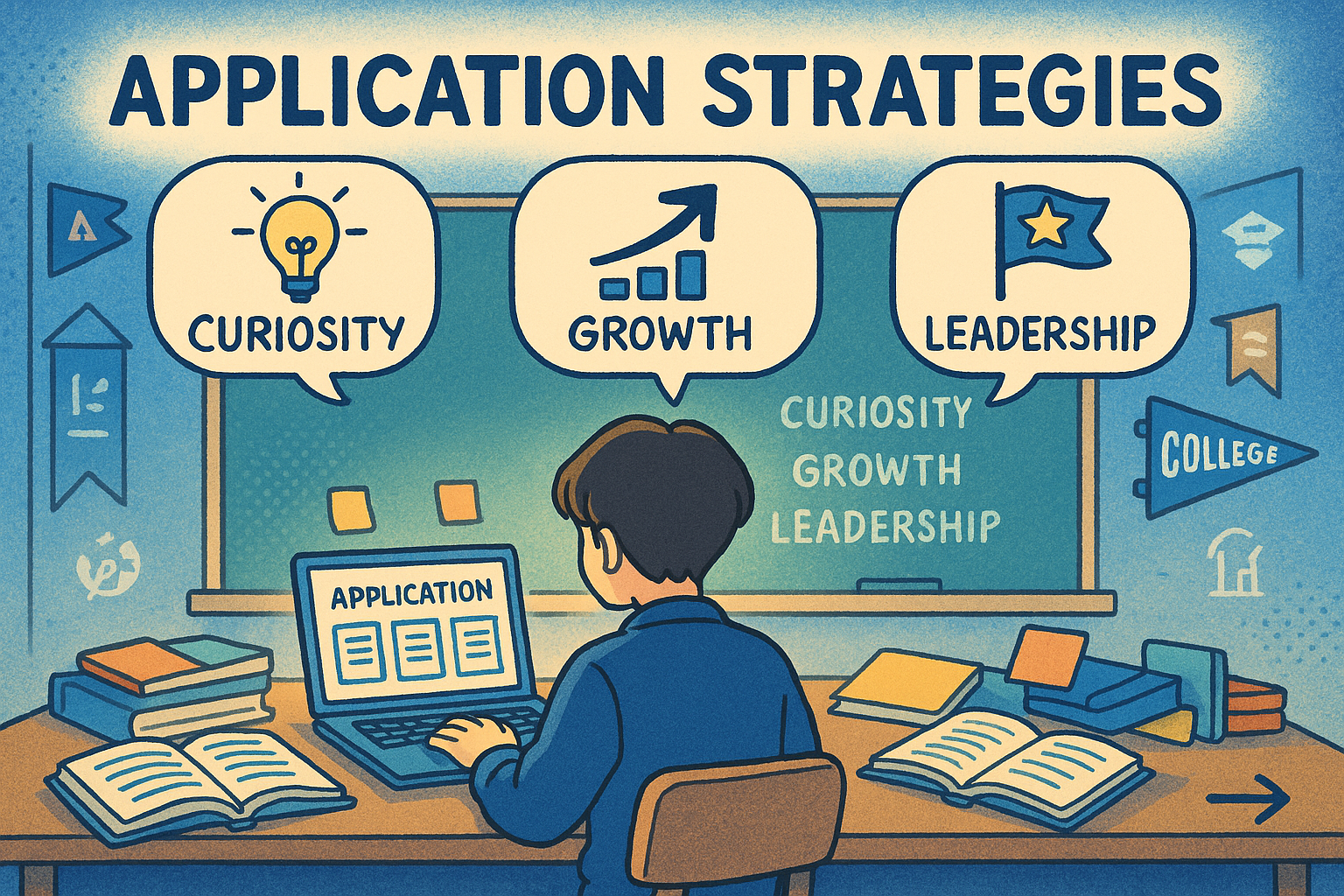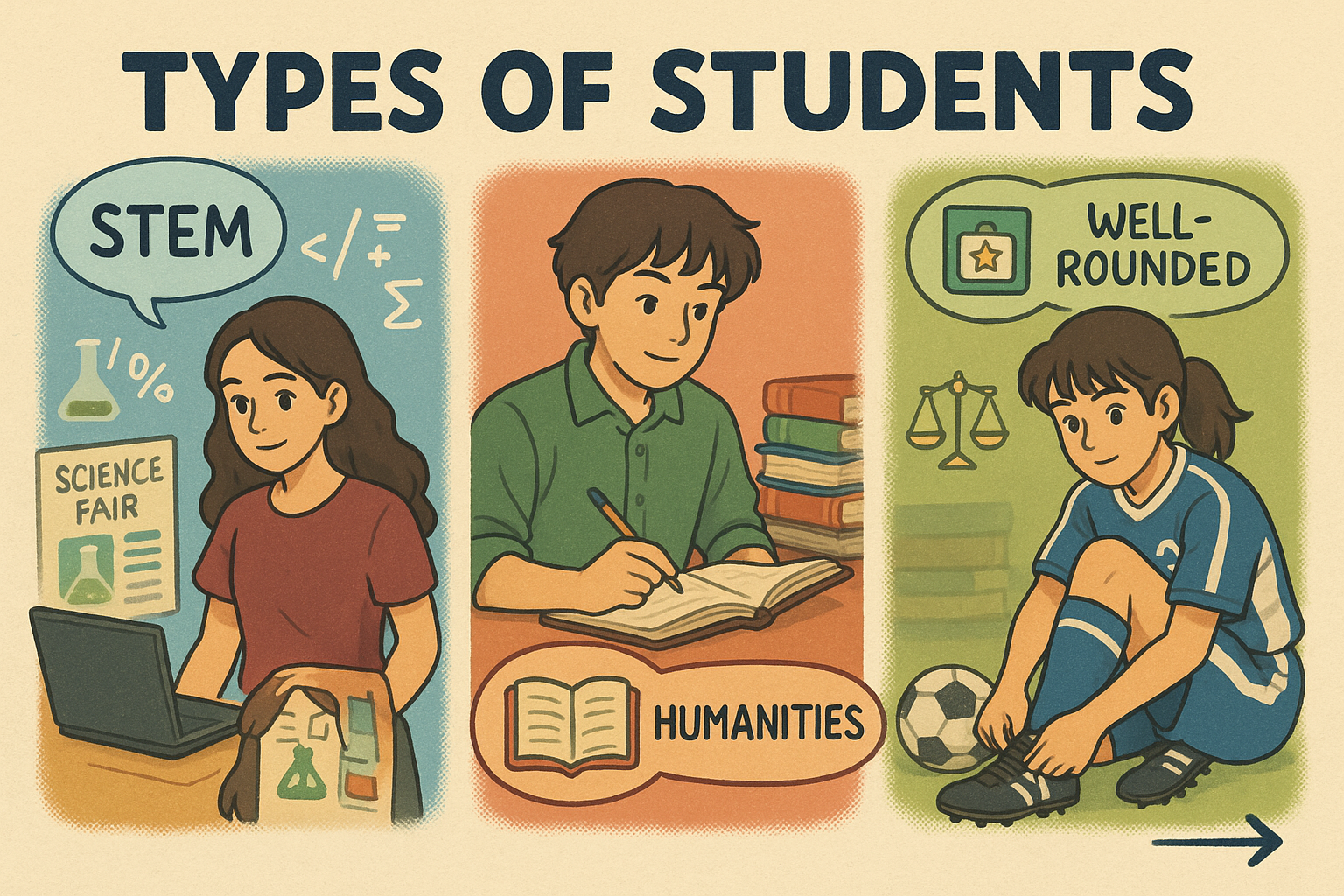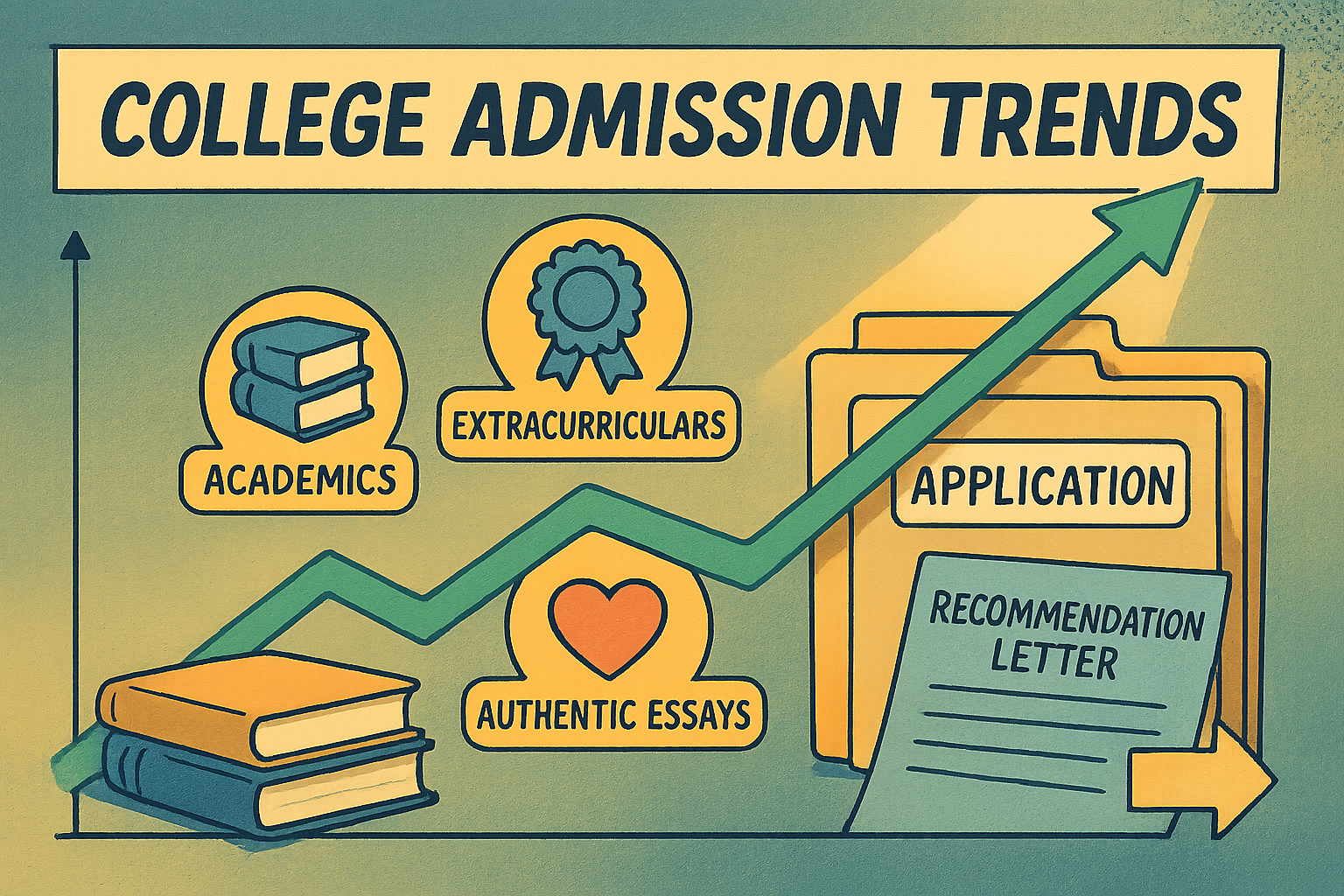Table of Contents
Introduction
In today's competitive academic landscape, college admission case studies have become essential tools for prospective students navigating the complex application process. These in-depth, real-world analyses of actual past applicants' profiles, decisions, and outcomes provide detailed insights into all application components, backgrounds, and feedback from admissions offices. By examining successful college applications, students can gain direct insight into the factors that lead to acceptance and demystify what often feels like an opaque selection process.
Recent surveys by The National Association for College Admission Counseling (NACAC) highlight the increasing value prospective students place on learning from peer application examples. As competition intensifies for spots at selective institutions, understanding the elements that make applications stand out has never been more crucial.
This comprehensive guide explores how college admission case studies can transform your approach to applications, featuring real examples, pattern analysis, and actionable strategies to improve your chances of success.
For those looking for a step-by-step walkthrough of the entire college application process—including timelines, essential checklists, and organizational tips—see our college application guide to supplement your learning from real-world case studies.
Why Study Successful College Applications

Reviewing college application examples provides clarity in what can often feel like a mysterious and overwhelming process. Many students focus exclusively on GPA and test scores, missing the nuanced factors that truly influence admissions decisions.
A study from IvyWise shows that understanding what works for real applicants helps demystify admissions and significantly reduces anxiety for students. This psychological benefit alone makes case studies valuable, but their strategic value extends much further.
The Strategic Value of Admission Success Stories
- Admission success stories reveal actionable strategies that transcend basic application requirements. They demonstrate:
- How essays can effectively communicate personal growth and intellectual curiosity
- Which extracurricular activities and leadership roles make the strongest impact
- How recommendation letters can provide crucial context about a student's character
- Ways to authentically highlight unique talents and perspectives
These insights help applicants understand not just what to include in their applications, but how to present their experiences in the most compelling way possible.
IvyWise: Why Case Studies Matter
For additional expert guidance on brainstorming, drafting, and editing your admissions essay, be sure to check out our essential resource: how to write a successful college essay that stands out.
Types of College Admission Case Studies
College admission case studies vary widely, reflecting the diversity of institutions and applicants in higher education. Understanding these different types helps you identify the most relevant examples for your situation.
By University Selectivity
University acceptance case studies typically fall into several categories based on institutional selectivity:
Each category reveals different priorities and evaluation criteria, making it essential to study examples relevant to your target schools.
If you’re particularly targeting the most prestigious institutions, see detailed strategies in our in-depth post: Get Into Ivy League With Proven Strategies And Expert Guidance.
By University Selectivity
| University Type | Examples |
|---|---|
| Ivy League and Elite Private Universities | Harvard, Yale, Stanford |
| Top Public Universities | UC Berkeley, University of Michigan, UVA |
| Selective Liberal Arts Colleges | Amherst, Williams, Swarthmore |
| Competitive State Universities | Penn State, University of Texas, Florida State |
| Specialized Institutions | MIT, Juilliard, Rhode Island School of Design |
Different university types featured in case studies and their corresponding examples.
By Applicant Background
College application examples also vary by student background:
According to College Board data, institutions increasingly value diverse perspectives and experiences, making these demographic factors increasingly relevant in the admissions process.
If you are planning to apply as a transfer student, or want insights into transfer admissions processes, check out our dedicated guide: Transfer Application Success Guide For Undergraduate And Graduate Admissions.
By Applicant Background
| Applicant Type | Key Considerations |
|---|---|
| Domestic vs. international applicants | Visa requirements, cultural context |
| First-generation college students | Unique perspectives, overcoming barriers |
| Underrepresented minorities | Diversity contributions, community involvement |
| Transfer students | Previous college performance, adaptation |
| Gap year applicants | Productive use of time, maturity |
| Student athletes | Athletic achievements, academic balance |
| Legacy applicants | Family connections, individual merit |
Applicant backgrounds and the key considerations shaping each type of case study.
By Academic Interest
Case studies often highlight differences in evaluation criteria across academic disciplines:
Understanding these distinctions helps applicants tailor their presentations to specific program expectations.
College Board: Trends in Higher Education
If you’re interested in computer science and want to see how top programs stack up, review our comprehensive guide: Computer Science Programs In America Guide To Top Schools And Admissions.
By Academic Interest
| Academic Field | Application Emphasis |
|---|---|
| STEM | Research experience, technical skills, problem-solving |
| Humanities and social sciences | Analytical writing, critical thinking, cultural awareness |
| Business | Entrepreneurial initiatives, leadership, practical application |
| Arts | Portfolios, creative accomplishments, artistic vision |
| Pre-professional tracks | Relevant experience, commitment, understanding of field |
Academic field breakdowns within case studies and key application emphases.
Deep Dive Sample Admission Success Stories

The heart of understanding college admission case studies lies in examining real examples. Below are comprehensive, anonymized profiles that illustrate successful applications across different backgrounds and institutions.
Case Study 1: First-Generation STEM Student at MIT
- Demographics: Female, first-generation American, public high school in suburban area
- Academics: 4.0 unweighted GPA, 1560 SAT, 800 Math II, 790 Physics
- Coursework: 12 AP courses (all 5s), including Calculus BC, Physics C, Computer Science
- Extracurriculars:
- Founded coding club at school
- State-level Science Olympiad medalist
- Summer research internship at local university
- Volunteer math tutor for underserved middle school students
- Essays: Focused on her experience bridging cultural traditions with scientific pursuits, connecting her immigrant parents' values to her passion for engineering
- Recommendations: Strong endorsements from math teacher and research mentor highlighting exceptional problem-solving abilities and collaborative skills
What Made This Application Successful:
The combination of outstanding academic credentials with meaningful extracurricular involvement demonstrated both aptitude and passion for STEM. Her essay effectively connected personal narrative to academic interests, showing reflection and purpose. The recommendations provided specific examples of her contributions and potential.
If MIT is on your target list, don’t miss the detailed breakdown of MIT admissions data and trends in our post: MIT admissions statistics reveal key insights for applicants to the 2025 class.
Case Study 2: Humanities Focus at Williams College
- Demographics: Male, middle-class background, competitive private school
- Academics: 3.85 unweighted GPA, 34 ACT
- Coursework: Rigorous humanities curriculum with honors English and history
- Extracurriculars:
- Editor-in-chief of school newspaper
- Founded literary magazine
- Regional debate champion
- Summer creative writing program at Northwestern
- Essays: Explored how analyzing literature helped him understand complex social issues in his community
- Recommendations: English teacher highlighted exceptional writing skills; debate coach emphasized intellectual curiosity and leadership
What Made This Application Successful:
This student demonstrated deep engagement with humanities through both academics and activities. His essay showcased analytical thinking and social awareness. The application showed a clear "fit" with Williams' emphasis on writing, discussion, and intellectual engagement.
Case Study 3: Well-Rounded Student at University of Michigan
- Demographics: Female, middle-class suburban background, public high school
- Academics: 3.9 weighted GPA, 1480 SAT
- Coursework: Balanced curriculum with honors and AP classes across disciplines
- Extracurriculars:
- Varsity soccer team captain
- Student government treasurer
- Hospital volunteer (200+ hours)
- Part-time job (15 hours/week during school year)
- Essays: Discussed how balancing athletics, academics, and work taught valuable time management and resilience
- Recommendations: Counselor emphasized maturity and work ethic; coach highlighted leadership and team-building skills
What Made This Application Successful:
This profile exemplifies the well-rounded student that large public universities often seek. Her balanced achievements across academics, athletics, service, and work experience demonstrated versatility and time management. The essay effectively connected these diverse experiences to personal growth.
A Crimson Education report found that essay authenticity and depth, not just academic stats, were critical for top-tier admissions. This student's reflective essay likely played a significant role in her acceptance.
Crimson: College Admissions Myths Debunked
For more inspiring stories of students who overcame obstacles to achieve their dreams, read our collection: Success Stories Of Students Who Overcame Challenges To Achieve Their Dreams.
Patterns and Insights from University Acceptance Case Studies

Analyzing multiple university acceptance case studies reveals consistent patterns that transcend individual institutions and applicant backgrounds. These insights can help guide your own application strategy.
Academic Excellence in Context
While strong grades and test scores remain important, successful college applications demonstrate academic excellence in context:
- Rigor matters as much as grades—challenging yourself in available courses
- Upward grade trends can offset earlier academic struggles
- Subject-specific excellence often outweighs general performance for specialized programs
- Test scores are evaluated relative to school averages and opportunities
According to FairTest analysis, the increasing presence of test-optional admits has shifted focus to coursework quality and grade trends rather than standardized testing alone.
For help keeping up with changing application policies and national shifts—like the move to test-optional—consult our comprehensive guide on what college admissions trends 2025 mean for your application success.
Meaningful Engagement Over Resume Padding
Across successful college applications, depth of involvement consistently outweighs breadth:
- Long-term commitment to fewer activities (2-3 years minimum)
- Leadership roles or increasing responsibility over time
- Measurable impact or achievement within activities
- Authentic passion rather than strategic participation
According to Ivy League admissions reports, over 70% of accepted students had deep commitment in 1-2 primary extracurriculars rather than superficial involvement in many.
Essay Authenticity and Reflection
Compelling essays in admission success stories share common characteristics:
- Personal voice and authentic perspective
- Specific, vivid details rather than general statements
- Reflection on growth, learning, or changed perspective
- Connection between personal experiences and future goals
- Insight into character beyond achievements
Essays that demonstrate vulnerability, intellectual curiosity, and self-awareness consistently appear in successful applications across institution types.
If you’re starting to brainstorm your own essay, these Common App Essay Examples To Inspire Your College Application Success will help you see what works in real admissions wins.
Recommendation Letter Patterns
Effective recommendations in college admission case studies typically:
- Provide specific examples rather than general praise
- Highlight character traits beyond academic ability
- Compare favorably to other students (top 5%, most creative in years, etc.)
- Address growth or overcoming challenges
- Connect student qualities to potential college contributions
The most impactful recommendations add new dimensions to the application rather than simply repeating information available elsewhere.
How to Apply These Lessons to Your Own Application
Learning from college application examples is only valuable if you can effectively apply these insights to your own situation. Here's how to translate case study lessons into actionable strategies.
Extract Relevant Patterns
Not all admission success stories will apply to your situation. Focus on examples that match your:
- Target institutions (selectivity level and type)
- Academic interests and strengths
- Extracurricular profile
- Demographic background (when relevant)
Create a checklist of elements that appear consistently in successful applications to your target schools.
If you want a visual timeline and actionable checklist for your personal application cycle, see our College Application Timeline Guide for a Successful Admissions Journey to organize every step confidently.
Authentic Differentiation
The most successful applicants find ways to stand out authentically:
- Identify your genuine passions and strengths
- Develop a consistent "theme" across your application
- Highlight unusual combinations of interests or perspectives
- Share specific stories that demonstrate your character
Remember that admissions officers read thousands of applications—authentic voices and unique perspectives capture attention.
Strategic Presentation
College application examples demonstrate the importance of how you present your experiences:
- Use specific, measurable achievements when possible
- Connect activities to skills developed or lessons learned
- Explain the "why" behind your choices and commitments
- Create a coherent narrative across all application elements
As College Essay Guy advises, "Show, don't tell" by using concrete examples and stories rather than claims about yourself.
For practical resources to help build your personal statement or essay, take advantage of our library of personal statement examples you can use for university and masters success.
Customization for Each Institution
Successful applicants tailor their applications to each school:
- Research institutional values and priorities
- Highlight relevant experiences and interests
- Demonstrate specific knowledge of programs and opportunities
- Explain why you're a good "fit" for the school's community
Generic applications rarely succeed at selective institutions—customization signals genuine interest and compatibility.
Leveraging Examplit for Your College Admissions Journey
Understanding college admission case studies becomes significantly easier with access to verified, comprehensive examples. Examplit curates and organizes real application profiles to provide actionable insights for prospective students.
Verified Case Study Collection
Examplit's library features:
- Authenticated successful college applications across institution types
- Comprehensive profiles including all application components
- Admissions officer commentary and feedback
- Regular updates reflecting current trends and policies
- Privacy-protected but detailed real-world examples
This verification process ensures you're learning from genuine examples rather than speculative or outdated information.
Personalized Research Capabilities
The platform allows you to:
- Filter case studies by demographic factors, academic interests, and target schools
- Compare multiple profiles side-by-side
- Identify patterns relevant to your specific situation
- Access full-length essays and activity descriptions
- Understand how different elements work together in successful applications
This personalized approach helps you extract the most relevant lessons for your unique circumstances.
Data-Driven Insights
Beyond individual examples, Examplit provides:
- Trend analysis across thousands of applications
- Statistical patterns in acceptances by school and program
- Identification of emerging priorities in admissions
- Comparative data on test scores, activities, and essays
These aggregate insights complement individual case studies to provide a comprehensive understanding of what works in college admissions.
For those starting their college journey and wanting a broad overview of all planning steps—including how application strategies tie into deadlines, testing, and financial aid—read our companion piece Master the College Application Process for Admissions Success.
Conclusion
College admission case studies provide invaluable windows into the often mysterious world of university admissions. By examining real examples of successful college applications, prospective students can identify patterns, understand evaluation criteria, and develop more effective strategies for their own applications.
The most valuable lessons from these case studies emphasize authenticity, meaningful engagement, and thoughtful reflection rather than formulaic approaches or credential accumulation. While academic excellence remains important, the most compelling applications demonstrate character, growth, and potential beyond numbers.
As you navigate your own college admissions journey, use these real-world examples as guides rather than templates. Extract relevant patterns, apply them to your unique circumstances, and develop an application that authentically represents your achievements, experiences, and aspirations.
Explore Examplit's comprehensive library of verified university acceptance case studies to gain deeper insights tailored to your specific goals and background. With the right approach to learning from others' successes, you can significantly enhance your own college application strategy.
And if you're interested in planning out your entire application season from start to finish, check out our detailed timeline resource: Master the College Admissions Timeline and Secure Your Place at Top Schools.

